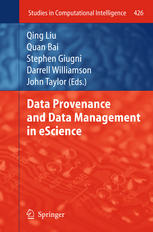

Most ebook files are in PDF format, so you can easily read them using various software such as Foxit Reader or directly on the Google Chrome browser.
Some ebook files are released by publishers in other formats such as .awz, .mobi, .epub, .fb2, etc. You may need to install specific software to read these formats on mobile/PC, such as Calibre.
Please read the tutorial at this link: https://ebookbell.com/faq
We offer FREE conversion to the popular formats you request; however, this may take some time. Therefore, right after payment, please email us, and we will try to provide the service as quickly as possible.
For some exceptional file formats or broken links (if any), please refrain from opening any disputes. Instead, email us first, and we will try to assist within a maximum of 6 hours.
EbookBell Team

4.4
82 reviewseScience allows scientific research to be carried out in highly distributed environments. The complex nature of the interactions in an eScience infrastructure, which often involves a range of instruments, data, models, application, people and computational facilities, suggests there is a need for data provenance and data management (DPDM). The W3C Provenance Working Group defines the provenance of a resource as a “record that describes entities and processes involved in producing and delivering or otherwise influencing that resource”. It has been widely recognised that provenance is a critical issue to enable sharing, trust, authentication and reproducibility of eScience process.
Data Provenance and Data Management in eScience identifies the gaps between DPDM foundations and their practice within eScience domains including clinical trials, bioinformatics and radio astronomy. The book covers important aspects of fundamental research in DPDM including provenance representation and querying. It also explores topics that go beyond the fundamentals including applications. This book is a unique reference for DPDM with broad appeal to anyone interested in the practical issues of DPDM in eScience domains.